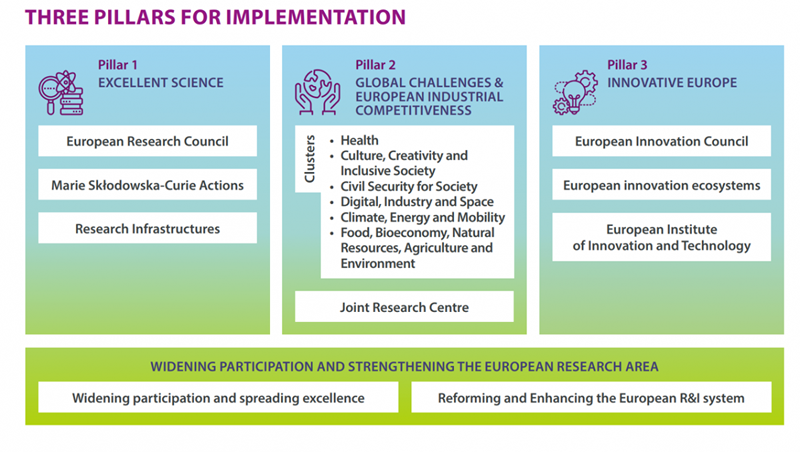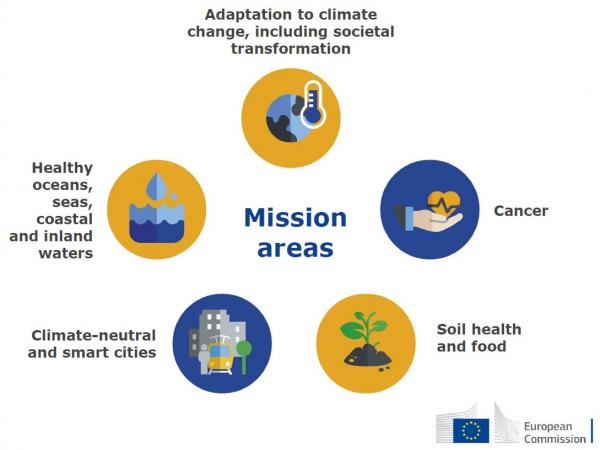Horizon Europe is an integral continuation of Horizon 2020, the framework programme of the previous seven-year cycle, but it adds a number of new elements:
- impact-oriented cluster programmes that encourage cooperation across sectors and technologies;
- missions to address key societal challenges;
- strategic initiatives co-financed by the EU, Member States and industry, the European Partnerships.
Focus will be brought to the need to deliver immediate social or economic benefits and to promote the green and digital transition. 35% of the framework programme budget will be used in relation to climate change objectives.
The structure of the framework programme is summarised in the figure below:

The Excellent Science pillar aims to boost the EU’s global scientific competitiveness. The European Research Council supports cross-border research projects proposed and carried out by the best researchers through its programmes, funds fellowships for experienced researchers through the Marie Skłodowska-Curie Actions, supports doctoral training networks, researcher exchange programmes and career development for young researchers, and invests in world-class research infrastructures.
The Global Challenges and European Industrial Competitiveness pillar supports research on societal challenges and strengthens technological and industrial capacities through clusters. EU missions have set ambitious targets to tackle major societal challenges (e.g., climate change, cancer research, soil health). It also includes the activities of the Joint Research Centre, which provides scientific analysis and technical assistance to EU and national decision-makers.
The Innovation Europe pillar aims to improve Europe’s position in supporting market-creating innovations through the European Innovation Council programmes. The pillar will also support the development of the European innovation environment through the development of European innovation ecosystems and the European Institute of Innovation and Technology, which will help integrate the knowledge triangle of education, research and innovation.
The Widening Participation and Strengthening the European Research Area parts of the programme will support EU Member States’ efforts to maximise national research and innovation potential, strengthen the capacity of countries with weaker research and innovation performance (widening countries) and create a European Research Area where researchers, scientific knowledge and technology can flow freely. As a result of political discussions during the preparation of the Framework Programme, the resources for the Widening Actions have been increased to 3.3% of the Horizon Europe budget.
Introduced as a new instrument of Horizon Europe, the missions aim to achieve spectacular results in addressing major societal challenges within given timeframes by coordinating EU, national, regional resources and programmes, as well as sectoral policies. Emphasis is placed on involving as wide a range of stakeholders as possible in the design and implementation of missions. The planned missions are grouped around the following social challenges:

The budget of the Horizon Europe programme (in billion euros)
Pillar I - “Excellent science”: EUR 25 billion of which |
|
| European Research Council (ERC) | EUR 16 Bn |
| Marie Skłodowska-Curie Actions | EUR 6,6 Bn |
| Research infrastructures | EUR 2,4 Bn |
Pillar II - “Global Challenges and European Industrial Competitiveness”: EUR 53,5 Bn, of which: |
|
| 1. “Health” cluster | EUR 8,2 Bn |
| 2. “Culture, Creativity and Inclusive Society” cluster | EUR 2,3 Bn |
| 3. “Civil security for society” cluster | EUR 1,6 Bn |
| 4. “Digital, Industry and Space” cluster | EUR 15,35 Bn |
| 5. “Climate, energy and mobility” cluster | EUR 15,35 Bn |
| 6. “Food, Bioeconomy, Natural Resources, Agriculture and Environment” cluster | EUR 15,1 Bn |
| Joint Research Centre (JRC) | EUR 1,97 Bn |
Pillar III - “Innovative Europe”: EUR 13,6 Bn of which: |
|
| European Innovation Council (EIC) | EUR 10,1 Bn |
| European innovation ecosystems | EUR 0,5 Bn |
| European Institute of Innovation and Technology (EIT) | EUR 3 Bn |
“Widening Participation and Strengthening the European Research Area”: EUR 3.4 billion of which |
|
| Widening participation and spreading excellence | EUR 2,96 Bn |
| Reforming and improving the European research and innovation system | EUR 0,44 Bn |






